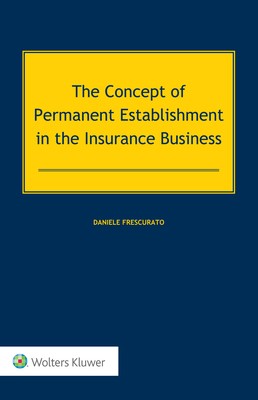
- Išsiųsime per 12–18 d.d.
- Autorius: Daniele Frescurato
- Leidėjas: Kluwer Law International
- ISBN-10: 9403532831
- ISBN-13: 9789403532837
- Formatas: 15.6 x 23.4 x 2.4 cm, kieti viršeliai
- Kalba: Anglų
- Extra -15 % nuolaida šiai knygai su kodu: ENG15
The Concept of Permanent Establishment in the Insurance Business (el. knyga) (skaityta knyga) | knygos.lt
Atsiliepimai
Aprašymas
The models commonly used for the negotiation of bilateral tax treaties have little to say specifically about the insurance industry, and in particular about how the dependent agent permanent establishment provision may affect cross-border marketing, promotion, and distribution of insurance products. This book, the first to focus on issues insurance companies face with regard to permanent establishment, provides an in-depth analysis of the way in which the concept is in fact applied in the context of the insurance industry and goes on to consider potential changes to the permanent establishment definition contained in tax treaties to reflect specific features of this industry.
Beginning with a thorough analysis of the insurance industry, its regulatory landscape and value chain, the study proceeds to systematically discuss the following aspects of the subject:
- comprehensive analysis of the dependent agent permanent establishment provision as laid down in model tax treaties and related commentaries;
- assessment of the existence of a dependent agent permanent establishment in the context of the most common business models adopted by insurance companies; and
- comparative analysis of double tax treaty policies adopted in a number of countries with respect to the permanent establishment provision in the insurance business, highlighting Switzerland for comparative purposes.
In a concluding chapter, the author proposes changes to the definition of the dependent agent permanent establishment currently enshrined in the model treaties and their respective commentaries, aligning such a definition to the regulatory framework in which insurance companies conduct their business in countries other than that of incorporation.
As a highly significant and timely contribution to the study of the interplay between insurance regulation and tax implications, this very original work will prove of especial value to practitioners in international tax and insurance law, as well as professionals in the financial services sector and tax academics.
EXTRA 15 % nuolaida su kodu: ENG15
Akcija baigiasi už 3d.00:24:12
Nuolaidos kodas galioja perkant nuo 5 €. Nuolaidos nesumuojamos.

- Autorius: Daniele Frescurato
- Leidėjas: Kluwer Law International
- ISBN-10: 9403532831
- ISBN-13: 9789403532837
- Formatas: 15.6 x 23.4 x 2.4 cm, kieti viršeliai
- Kalba: Anglų
The models commonly used for the negotiation of bilateral tax treaties have little to say specifically about the insurance industry, and in particular about how the dependent agent permanent establishment provision may affect cross-border marketing, promotion, and distribution of insurance products. This book, the first to focus on issues insurance companies face with regard to permanent establishment, provides an in-depth analysis of the way in which the concept is in fact applied in the context of the insurance industry and goes on to consider potential changes to the permanent establishment definition contained in tax treaties to reflect specific features of this industry.
Beginning with a thorough analysis of the insurance industry, its regulatory landscape and value chain, the study proceeds to systematically discuss the following aspects of the subject:
- comprehensive analysis of the dependent agent permanent establishment provision as laid down in model tax treaties and related commentaries;
- assessment of the existence of a dependent agent permanent establishment in the context of the most common business models adopted by insurance companies; and
- comparative analysis of double tax treaty policies adopted in a number of countries with respect to the permanent establishment provision in the insurance business, highlighting Switzerland for comparative purposes.
In a concluding chapter, the author proposes changes to the definition of the dependent agent permanent establishment currently enshrined in the model treaties and their respective commentaries, aligning such a definition to the regulatory framework in which insurance companies conduct their business in countries other than that of incorporation.
As a highly significant and timely contribution to the study of the interplay between insurance regulation and tax implications, this very original work will prove of especial value to practitioners in international tax and insurance law, as well as professionals in the financial services sector and tax academics.




Atsiliepimai